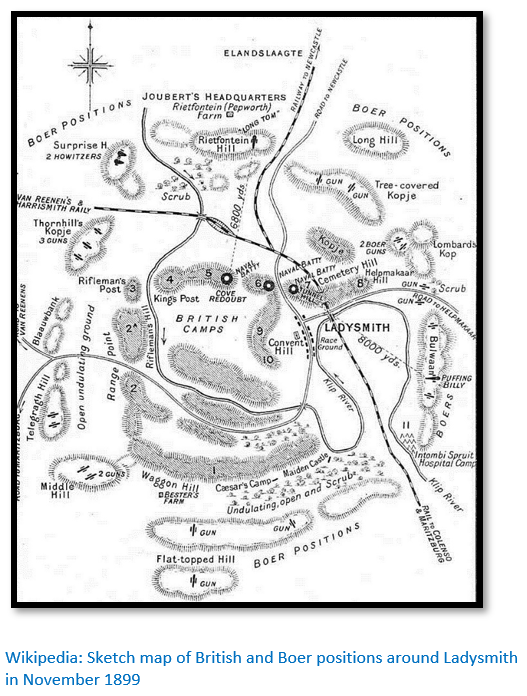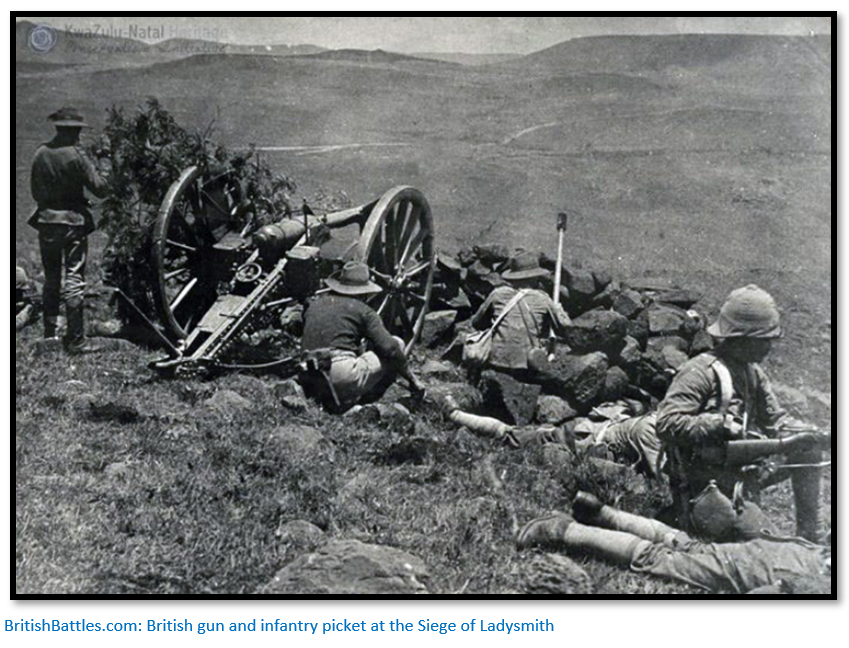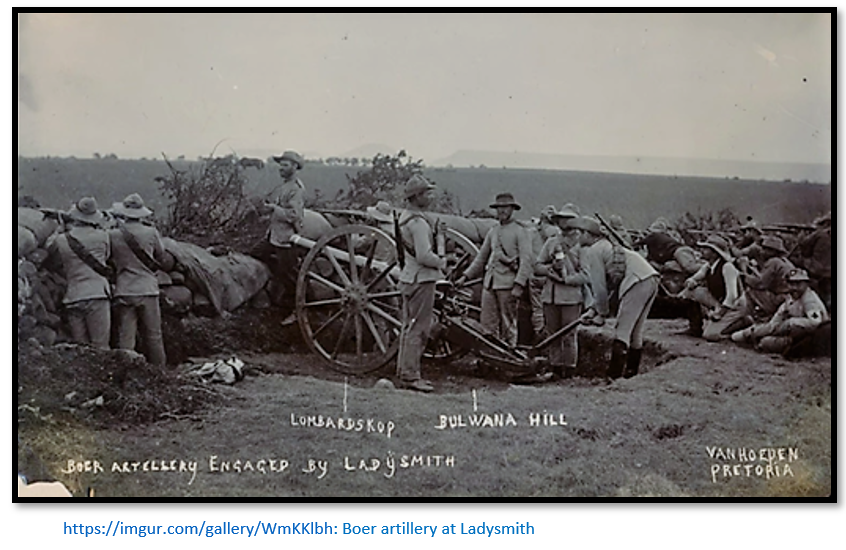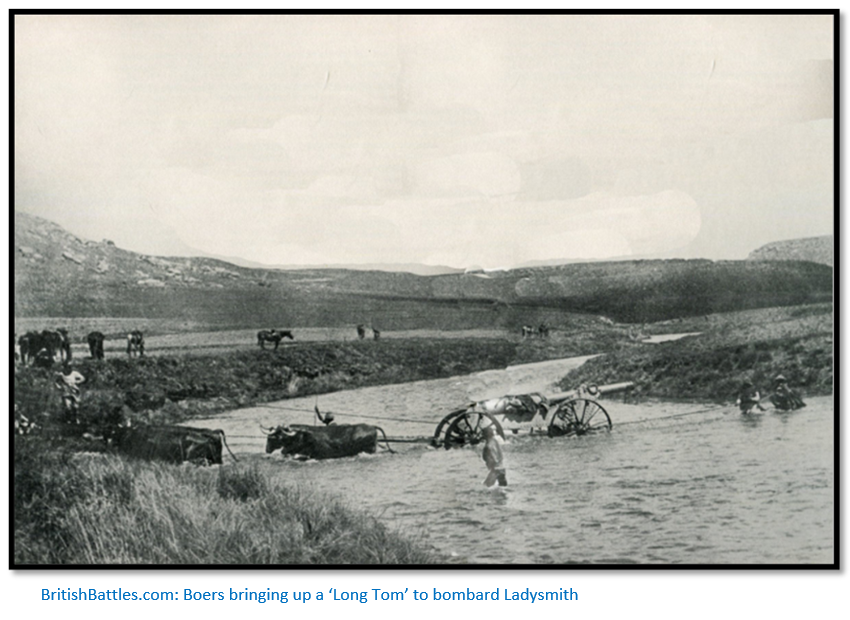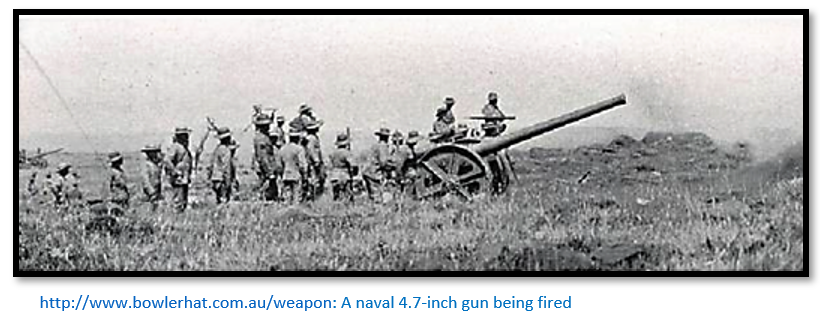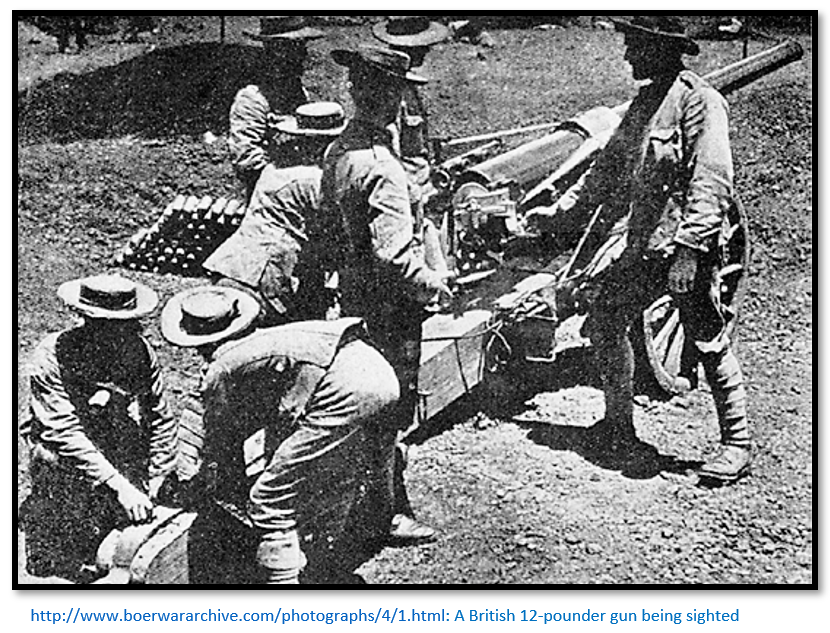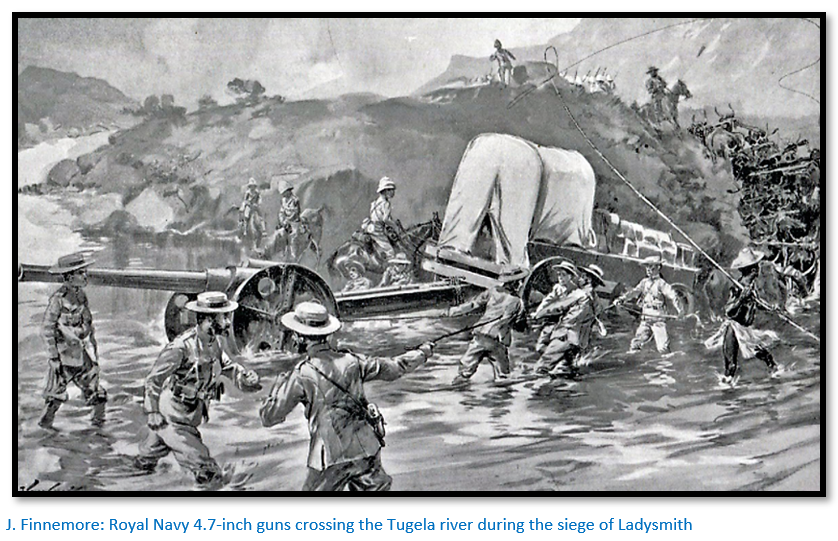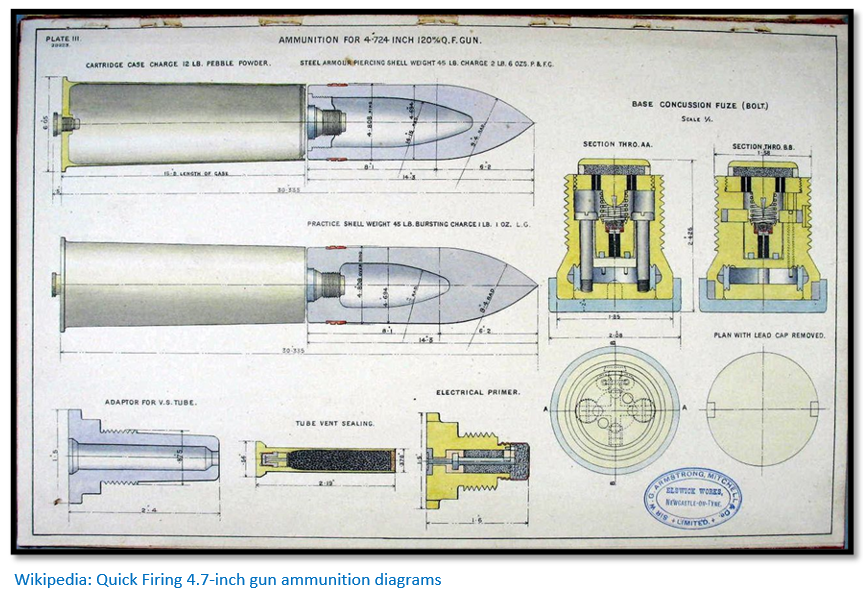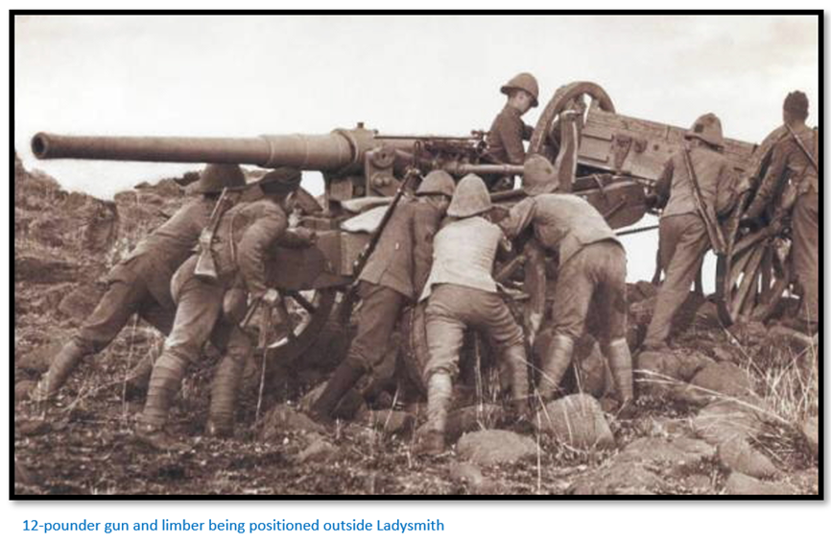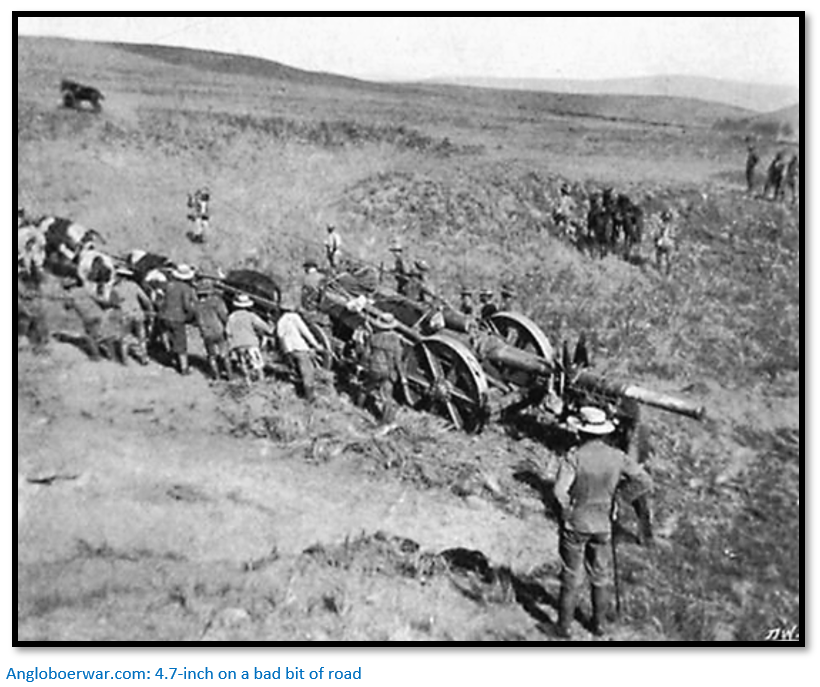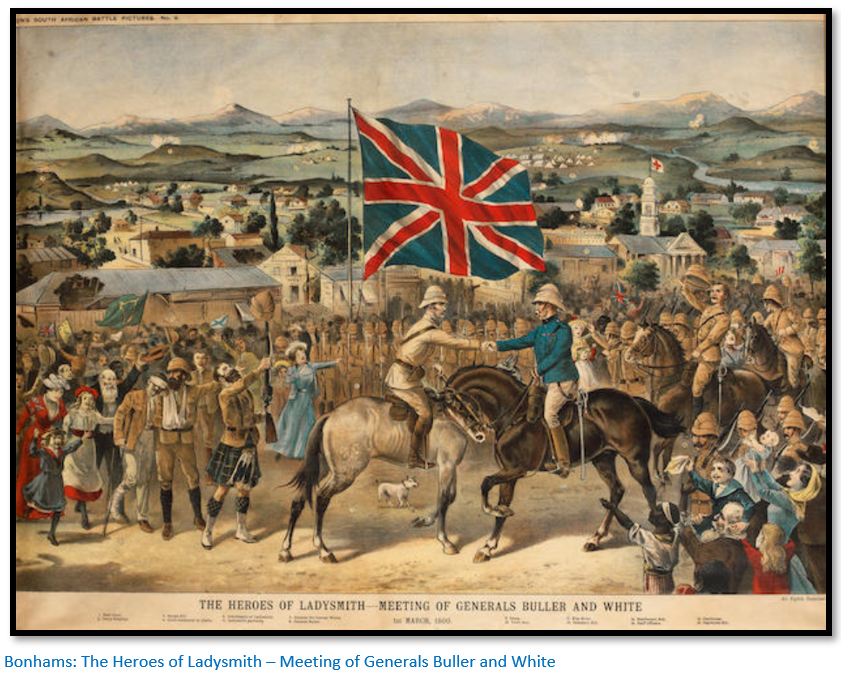Letters from the Siege of Ladysmith by Edward Carey Tyndale-Biscoe
Background
The article Edward Carey Tyndale-Biscoe who raised the flag at Salisbury, now Harare on 13 September 1890 is under Harare on the website www.zimfieldguide.com and gives the background and history of the author of the letters which follow. For the above article I used the book Sailor Soldier which was written by his great nephew David Tyndale-Biscoe.
The letters were transcribed by his grandson Hugh Tyndale-Biscoe and were donated with other family-related material to the archives of Jesus College, Cambridge in January 2019. The letters were written to his sister Frances (Fan) and brother Cecil during the Siege of Ladysmith where Edward served as a volunteer from 1 November 1899 and was given the rank of Retired Lieutenant and later commended for his services “as a very valuable and reliable officer” by the commander of the Naval Brigade, Captain H. Lambton, RN.
Edward’s brother Cecil served as a missionary in Kashmir becoming a legend for the ideas and principles he instilled in the children in the six boys’ schools and one girls’ schools he founded. His great nephew Hugh Tyndale-Biscoe has written an inspiring book about his life The Missionary and the Maharajas which is published by Bloomsbury and provides a fascinating read about Kashmir when it was a far-flung outpost of the British Empire.
The role of the Royal Naval Brigade in the second Anglo-Boer War 1899 - 1902
The cruisers, HMS Terrible and HMS Powerful were at Cape Town when the British Commander in Natal, Lieutenant General Sir George White VC, requested help with long-range guns. Luckily, Captain P. Scott RN of HMS Terrible was a gunnery expert and he quickly designed a carriage that could be used to transport 4.7-inch and 12 pounder naval guns on land and in action.
The guns and equipment were taken to Durban by HMS Terrible and the carriages were built in the Durban Railway workshops. Under the command of Captain H. Lambton RN, the 280 officers and men with two 4.7-inch guns, four long range 12 pounders and four maxim guns of the Naval Brigade as they were now called, left Durban by rail for Ladysmith. Their train was the last to complete the journey to Ladysmith on the 30th of October just as the siege and Boer bombardment started.
28 October 1899 The Battle of Ladysmith
As the Boers began to surround Ladysmith, White ordered a sortie by his entire force to capture the Boer artillery but this resulted in the disastrous Battle of Ladysmith, in which the British were driven back into the town having lost 1,200 men killed, wounded or captured.
The siege of Ladysmith - 2 November 1899 to 28 February 1900
The Naval Brigade which Edward Tyndale-Biscoe joined on 1 November 1899 as a volunteer with the rank of Retired Lieutenant were soon in action against the Boer artillery; their long-range guns were so effective in countering the enemy batteries and holding them at bay that it was not long before Captain Scott was asked to provide another brigade. They were quickly in action with the new brigade acting in support of General Buller's push towards their besieged comrades at Ladysmith. The railway could not be used so the guns had to be manhandled over difficult terrain to be brought into action in many different engagements, eventually reaching Ladysmith after 120 days of blockade.
The Naval Brigade from HMS Powerful took part in a number of important battles with the Boers during the fight for the relief of Ladysmith:
- 25 November 1899 - The Naval Brigade fought in the Battle of Graspan
- 6 January 1900 - The Naval Brigade held back a strong Boer attack at Ladysmith.
- 30 October 1900 - The Naval Brigade attacked Boer positions at Lombard’s Kop, Ladysmith
The Relief of Ladysmith
The news of the relief of Ladysmith was greeted with great joy in Britain and Queen Victoria sent a telegram to the Naval Brigades thanking them for their invaluable assistance. Leaving Ladysmith on the 7th of March 1900 the sailors of HMS Powerful and HMS Terrible were soon back on board; the HMS Powerful heading for home and arriving in Portsmouth on the 11th of April 1890.
The officers and men of HMS Powerful were soon invited to a number of military and civic receptions culminating in a Royal audience with Queen Victoria where she personally thanked the ship's company for their part in the saving of Ladysmith.[i] Edward wrote to his brother Cecil saying “I have to undergo the painful operation of public dinners” once he was back at home.
Naval Brigade Camp
Ladysmith
Saturday Nov 11th, 1899
My Dearest Fan
I don’t know when we shall be able to send letters, but I hope in a few days’ time as we are expecting the relief column to be here within a week or so. My last letter was from Durban, so I will tell you my doings since then:
I left Durban on Monday evening (October 30th) in a train. There were a good many soldiers, nurses on board. At Pietermaritzburg we took on many more. On Tuesday morning, when we were about twenty miles from Ladysmith, we could hear firing going on. We were delayed in Colenso, a place about fifteen miles south of here. This was to allow several trains to pass. They were full of soldiers who had come to defend Colenso. We arrived in Ladysmith about 6.30 pm. I managed to find a bed in the Railway hotel. I could not find the O.C. of the Naval Brigade until Wednesday morning. He is Captain Lambton. I hoped that my experiences gained as gunnery officer in the pioneer column to Mashonaland and in subsequent battles in Matabeleland would be of use. He officially signed me on as a member of his ship, HMS Powerful, as Naval Lieutenant (Retired) from 1st day in November 1899. I am now part of the Naval Brigade.
The brigade here consists of 250 men and six guns. The officers consist of the Captain himself, four lieutenants, two engineers, the paymaster, the doctor, six midshipmen and a gunsmith. I knew two of the lieutenants slightly. There was incessant work, building bastions and trenches around our position and guns. We are situated on a range of hills to the north of the town. They were glad of my help.
On Thursday morning we opened fire with one of our large naval guns. The 4.7” carries a shell weighing about 50 pounds. We have two of these. The others are 12 pounders. We were returning the fire of a “Long Tom” that the enemy had dragged up onto the summit of a high hill about 8 000 yards off. It has a shell weighing 96 pounds. The Boers made splendid shooting. Their shells burst all round our position. One shell unfortunately fell inside the bastion. It was not built high enough. It hit Edgerton, the gunnery lieutenant of the Powerful, taking off one of his legs above the knee, and the other below the knee. He was carried down to the hospital. Both legs were amputated. However, he died after the operation. Everyone in the Naval Brigade was awfully cut up about his death. He was very popular.
The artillery duel continued all day. We used our 4.7’s and 12 pounders, whereas the enemy used guns of various sizes that they had placed on high hills surrounding the town. I don’t think that any of us had been under shellfire before, but we soon got used to it. We can now tell pretty well in advance in which direction the shells are coming and can take cover in time. That is if there is any cover to hide behind.
In the afternoon, the enemy cut the telegraph wire and captured the railway line from Colenso. The siege of Ladysmith began. On Friday, the artillery duel continued. The enemy fired on the town itself and on our batteries. They did not do much damage. A lucky shot from one of our shells put one of their Long Toms out of action for some time. Our troops were out in three directions, engaging the enemy. The enemy were driven back some distance. There was little loss on our side. On Saturday 4th November, General Joubert of the Boer commandos, sent in a message to our General White, advising him to remove all the wounded in the hospital, the women, the children and unarmed men out of the town as he intended bombarding the town in earnest. He agreed to a 24-hour armistice for this to be effected. A camp was formed about three miles South-East of the town to which all the said people were sent.
On Sunday 5th November, we had a quiet day. The Boers do not fight on Sunday if they can help it. We were very pleased to have a respite. On Monday 6th November, we expected a heavy bombardment. However, the enemy only fired a few rounds. They seemed to be placing new guns on the hills. During the night, an officer of the 5th Lancers walked in from Escourt. He announced that the force at Colenso had retired there.
On Tuesday, there was heavy firing all day. Unfortunately, we are short of ammunition. We have to be very sparing with it. One of our soldiers was killed and two were wounded in the Leicester’s. Firing continued on 8th November but it was not as heavy as the day before. A shell came into one of our tents and wounded one of our men. Fortunately, it did not burst. I went down to the 19th Hussars camp in the afternoon and saw Fanshaw. I have come across a great many other friends of the family here. There are three in my brother Julian’s regiment here, the 11th Hussars, Codrington, Fitzgerald, Daniel and Aberdie. They all seem very busy.
On Thursday 9th November, the Boers opened fire at daylight and attacked three of our positions but were driven off with heavy losses. Our losses were comparatively light. We had twenty men killed and a number wounded. On Friday 10th, we expected a renewal of yesterday’s attack, but had a quiet day instead. The enemy were evidently collecting their killed and wounded. It rained hard in the afternoon. It made things uncomfortable, but we cannot complain. We have tents and still plenty of food. On Saturday 11th it rained all morning. The enemy positions were obscured in mist. This meant that they could not fire. The weather cleared up in the afternoon. Shelling then recommenced. One of our men was wounded in the head by a piece of shell.
On Sunday 12th, we had the usual quiet day. On Monday 13th, in the morning, the Boers commenced firing all round us. They stopped again after three or four hours. Since then, it has been quiet.
We have a strong position here. The guns are in bastions made with rocks and earth. We have stone and sandbag breastwork all along the hill. The only drawback is that the enemy guns enfilade our position from hills higher than our own. But their shooting is not as accurate as ours. Several of their guns have been put out of action for a time by our fire. So far, they have not done any damage to our guns. The ground about our battery and camp has been ploughed up with their shells. The ground is strewn with various pieces. It is a miracle how little damage has been done.
This war is being carried out in a curious way. The other day, our wounded, in enemy hands, numbered about 90 men. They were sent back here in return for any of their own wounded. The Boers asked leave to come and fetch them. They sent in a doctor or two. They asked for medicine as they were running short. So, we gave them what they wanted. The Boers don’t seem to realize that the flag of truce should be used for parley or surrender. They are always hoisting the white flag whenever they don’t want to be fired at. They even fired at one of our ambulances as they thought we were moving guns in it, using the same strategy as they were accustomed to use.
It is very fortunate that the Naval Brigade came up here in time. If they had not come, the Boers would have been in possession of Ladysmith by now. Our guns are the only ones that that can carry the same distance as theirs. They have placed another Long Tom (96 pounder) on another hill to the East of the town a day or two ago.
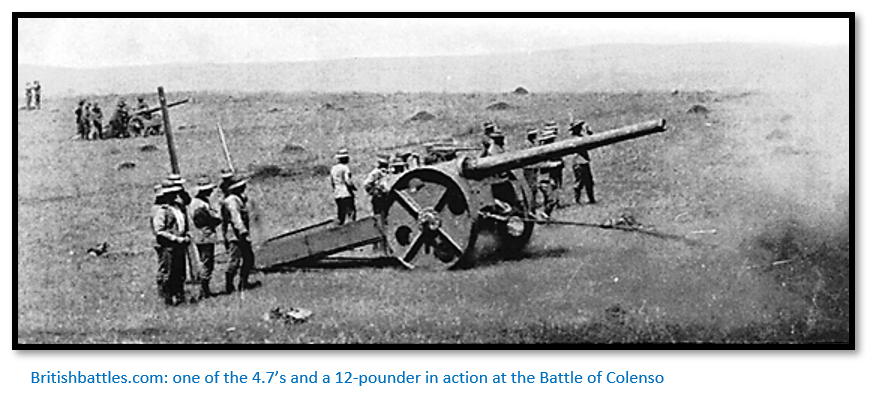
Thursday 23rd November 1899
Here we are still shut up in this hot and fly infested town. The bombardment goes on with more or less intensity every day except Sundays. This is rest day for the Boers. Today there are a good many shells bursting over the town. There has been little damage done, considering the number of shells. Few people have been hit so far, but a few houses have been wrecked. We have shifted our camp from the top of Junction hill to its base. The enemy had mounted a 40-pounder gun on a hill overlooking our camp. They had a nasty habit of dropping shells into it during mealtimes or whenever they saw any men in the camp. We are now camped in a garden, at least the officers’ tents are in the garden.
A dummy battery with six sham guns was made a few nights ago. They are accompanied by dummy figures, activated by chords attached to them. The enemy has been amusing us by firing shells at this battery and wasting ammunition.
We have not had any news for ten days now. We are anxious to hear how the armies are progressing in the Free State or wherever they are. The Boers captured an armored train last week down the line at Chieveley. They destroyed the line in rear of the train and then opened fire on it. Six men were killed and 15 were wounded. About 60 were taken prisoner.
I am afraid that this letter will not reach home until after Christmas. I hope you will all have had a happy one. Captain Lambton has invited me to return home in his ship, the Powerful, whenever we can eventually get away. However, I think I should visit Salisbury in Rhodesia for a short time. This means that I might not reach Cape Town in time to embark.
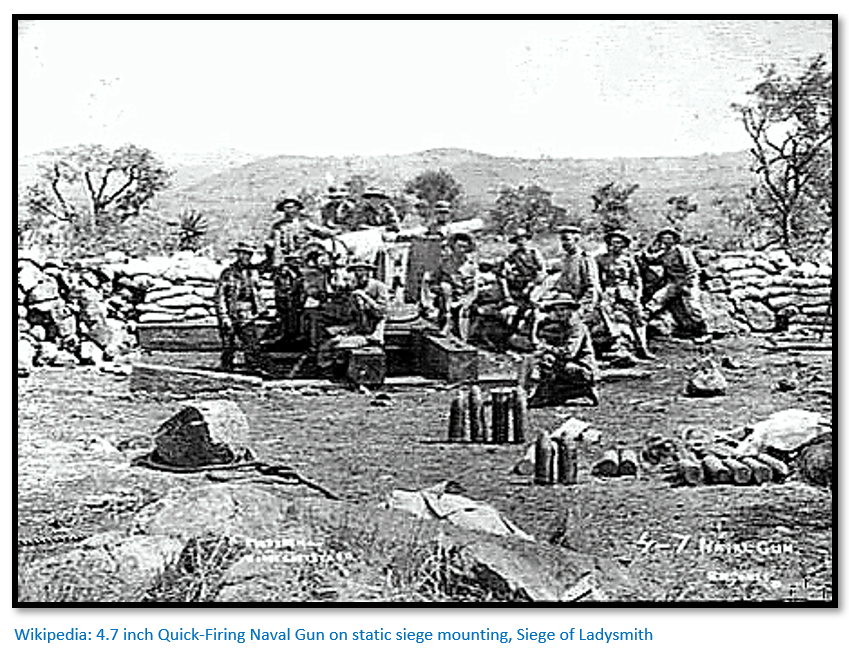
Friday December 1st, 1899
Here we are, still shut up under siege. The force under General Clery is not far off. His force may be here any day now. Meanwhile the bombardment of the town continues. There has been another six-inch Long Tom gun mounted on a high hill to the south of the town. In response, our artillery has mounted two howitzers. These carry shells which weigh over 100 pounds. Yesterday morning a force was to have gone out on a sortie, but the Boers were warned in advance by one of their numerous spies. This meant that the affair was aborted. But a number of the enemy advanced pretty close to our outposts in the early morning. A brisk fire exchange took place with both rifles and guns. It lasted for about one hour. No particular damage was done. Several shells have burst in the town hall. It is being used as a hospital. Yesterday, one man was killed and eleven wounded. I am glad to say that the wounded have been moved out of the town hall to a safer place. I believe that the Boers fired at it on purpose. It is a conspicuous building and has a large Red Cross flag flying on the roof.
There has been very little for us to do lately. Most of my time is spent in the observation tower, watching the enemy firing their guns and the shells bursting. We turn out every morning at 3h15 and stand to arms. This is to be ready in case the enemy makes an early morning attack. During daylight, we take it in turns with one of the other lieutenants to keep watch at the observation tower. We have telephone communication with various other positions around the town, and to the balloon. It goes up whenever the weather is favourable.
Saturday 9th December 1899
Another week has gone by. Nothing has changed. The Boers are not as sure as they were that they will be able to take the place. Lately, they have not been firing so much. I expect that they are conserving their ammunition for the pending fight. It must take place before long.
The night before last we had a great success. A party consisting of a 100 men from the Imperial Light Horse and another 100 Carbineers, under the command of General Sir A Hunter, surprised one of the enemy positions. They crested the summit of a hill unobserved. When they were close to their breast works, the order was given to fix bayonets. On hearing the order, the Boers deserted the position. The joke was that our soldiers had no bayonets to fix. Two guns, one of the six-inch Long Tom guns and a 40 pounder were destroyed. A maxim was captured. It was a splendid piece of daring subterfuge. Our loss was only one killed and four wounded. Yesterday, after the raiding party had returned, two regiments of cavalry made a reconnaissance. They found large numbers of the enemy entrenched on the hills. They opened fire on our cavalry, thus revealing their position. We, together with the rest of the artillery, shelled the enemy position for about an hour. The cavalry returned with the loss of three killed and twenty wounded. The Boers then fired on our ambulance party that went out to pick up the wounded. It is something that they are always doing.
We are within signaling distance of the relief column. Many messages are being exchanged between the General Buller and General White, but we don’t glean much. Only a letter that was picked up from one of the destroyed Boer guns. A Boer wrote it to his sister. The following is an extract:
“It is a month and six days since we besieged Ladysmith. I don’t know what will happen in the future. We see the English every day walking about the town and we bombard it regularly with our cannon. They have erected plenty of breastworks outside the town. Near the town they have two Naval Guns. We receive very heavy fire from them. We cannot stand it. I think that before they surrender, there will be much blood spilt. The Englishmen fight hard and well. Our burgers are a bit scared. I would like to write more, but the sun is hot and the flies are bothersome. I am not allowed to sit still.”
There is a good deal of sickness in the camp. Typhoid and dysentery are rampant. I hope we shall make a move soon.
Monday 13th December 1899
We could hear the booming of heavy guns this morning. We conclude that this means that the relief column is having a fight near Colenso. Hopefully, they have found a way across the Tugela River.
Early on this day 200 men of the rifle brigade surprised another of the enemy’s positions. They destroyed a 40-pounder gun. Unfortunately, there was some delay in getting the charge to explode. This meant that the Boers had time to collect themselves and make an attempt to cut off the retirement of the raiding party. It had to fight its way back. The result was that 11 men were killed or mortally wounded. About another 30 men were wounded. The Boers were on both sides of them during the withdrawal. They actually fired into one another. Consequently, the Boers suffered even more casualties. They lost thirty killed and another 70 wounded.
December 30th, 1899
We are still shut up. General Buller has evidently found the enemy, under General Botha, in such a strong position on the Tugela hills that he has had to wait for siege guns to drive them out. He has only two Naval guns with him. Nearly every day we can hear them booming away at intervals. I think that the relief column has merely got as far as Colenso. The electric signaling light seems to come from there. I wonder if my brothers, Julian and Albert have arrived in South Africa yet. I shall only hear when the rout is opened again. I sent a cable to you on the day before this place was invested. I hope that you received it.
My brother Albert’s friend, Lyons (R.A.) is here on the staff of General White. My brother Arthur’s friend from Somerfield, Cotton, is in the 19th Hussars. We had a very good Christmas dinner consisting of turkey and plum pudding. However, I am afraid that some of the garrison did not do so well. Enteric and dysentery are both very bad. There are over 1 000 men in hospital. Our own brigade has two lieutenants, four midshipmen and about sixty blue jackets ill. The sooner we are relieved, the better it will be for all of us.
Surprisingly, the Post Office opened today for the first time for two months. There must be a native runner system operating through the enemy lines. I will just post this letter so that it will be ready to go at the first opportunity.
With much love from your affectionate brother
Edward C. Tyndale-Biscoe

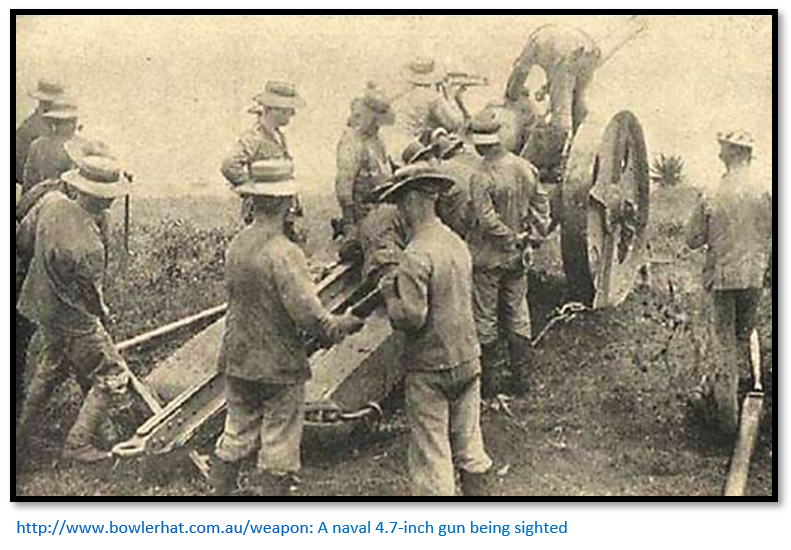
Naval Brigade Camp
Ladysmith
Wednesday Nov 15th, 1899
My Dear Cecil,
I hope that you are all well in Kashmir. This leaves me in the beleaguered city. It is raining hard. The enemy’s guns are enveloped in mist, so, we are having a quiet day for a change. It is rather disconcerting dodging shells all day. The enemy is estimated to comprise about 25 000 men, but this could be an overestimate because of its mounted mobility. It has taken up positions on the high hills around the town, about 8000 yards off. We have made ourselves trenches on lower hills around the town. The town itself lies in a hollow. Unfortunately, we are low in ammunition and we cannot return enough fire to our satisfaction. It means that we have to be accurate with the few shells that we have. Several times we have silenced their guns for a time. We have only actually destroyed one 12 pounder. The enemy has about 20 guns in position. They are of various sizes. They have two Long Toms. They are 96 pounders. The rest are field guns and a few maxims.
The Naval Brigade has two 4.7” guns. They carry shells of about 50 pounds. We have four other 12 pounders and three maxims. All the guns were taken from the ship H.M.S. Powerful, now docked in Durban. Our two 4.7” guns are the only ones in Ladysmith that can match the Long Toms for distance, that is about 8 000 yards. Our ship’s compliment here comprises 280 men. Apart from Captain Lambton, we have four lieutenants, six midshipmen, one paymaster, one doctor, one gunner. Another lieutenant, Edward Stabb, who was in the Naval Reserve has also joined us. I arrived here on Tuesday 31st October and joined the Brigade on the 1st of November. The Boers cut off our communications from the outside world on the same day. We have been in a state of siege since. If the Naval Brigade had not reached Ladysmith in time, the town would have fallen. Our six regimental batteries would be no match against the long-range guns of the enemy. Our presence here is pivotal to the war effort in that we have succeeded in halting the advance of the enemy forces on their way to Durban. We have engaged a major portion of their army here while the delay has given our forces time to build up in Natal. Call it “Destiny” if you like.
General Joubert, commanding the Boer forces, “kindly” sent in word before he started his bombardment of the town. He gave us 24 hours to remove the wounded, women and children and non-combatants to a place about four miles down the line. They are practically prisoners in that the site is inside the lines of the enemy. Townspeople who have decided to remain have made themselves caves in the bank of the Klip River, and into the hillsides. They run like rabbits into these whenever the shelling commences. So far, the bombardment has done little damage. Few people have been hit. In the Naval Brigade we have lost one lieutenant. Edgerton was the gunnery officer on H.M.S. Powerful. He has been killed and two of our bluejackets have been wounded. Poor Edgerton was hit by a 96-pound shell fired from an enemy Long Tom. He lost his right leg above the knee and his left below the knee. I was close to him at the time. He was so plucky about it and said that he was afraid that his cricket days would probably be over. He lit a cigarette as he was being carried down to the hospital. The doctor operated on him as soon as possible, but the shock was too great. He did regain consciousness after the operation, but he died. Both legs had to be amputated.
I have met a many friends of the family hereabouts. From our brother Julian’s regiment, the 11th Hussars, I have met Codrington, Fitzgerald, Abeden. Several men here met you in Kashmir. Very few of our men have experienced shellfire from an enemy before. It can be terrifying, but one soon becomes accustomed to it. One can tell pretty well in which direction the shell is heading and can take cover in time. That is if there is anything to hide behind. A 12-pound shell nearly caught me yesterday evening. It passed just over my head and burst 10 yards away.
We have been having quiet nights until last night. The enemy decided to fire one round from each of its guns shortly after midnight. We turn out at 3h30 every morning and stand to arms. This is to be ready in case of an early morning attack. I have been put in charge of a 12-pounder and a maxim gun on the extreme right of our position.
We are expecting the relief column in a few days. The relieving force, commanded by General Buller, are advancing up the line from Pietermaritzburg. I expect that when they approach, we shall send out our force from Ladysmith to link up with them. The midshipmen are as happy as sand boys. One of them confided in me that they did not like being under shellfire on the first day of the bombardment but had become used to it now. He seems to think that it is rather fun dodging shells. Our battery and camp are strewn with pieces of shell. The ground about us is ploughed up in all directions. We have great cause to be thankful that so few men have been hit. All day long sniping goes on at our advance posts. Sometimes, some of the enemy creep up to within rifle range of our positions. They fire shots at random. These pass over our heads.
The Boers don’t seem to know the use of a white flag. They use it on all occasions when they particularly do not want us to fire at them. They even fired on one of our ambulance wagons the other day as they thought were moving a gun in it. They judge others as themselves. Other than that, they are behaving well. They treat our wounded well whenever they fall into their hands. They asked us to send them chlorotet’ the other day. They said that their people were suffering from dysentery. We sent them some. There does not seem to be any feeling of hatred between the two armies. It is unusual.
Thursday 23rd December 1899
The day or two has lengthened out into ten days. It could be extended for at least another week. I believe that we are helping General Buller and his army by keeping the Boer army engaged here in Natal whilst the rest of his army marches through the Free State and Transvaal to engage the enemy there. We have not had any news for ten days and are most anxious to hear how the war is progressing. We are becoming rather tired of being shot at and doing so little ourselves except dodge shells. For the moment, things have become more lively as shells are buzzing overhead and bursting somewhere in the town. I expect everyone has taken refuge in their holes by now. I hope no one will be hit. So far, there has been little damage. It is a miracle considering the thousands of rounds of shell that have been rained upon us. The Boers do not fight on Sundays if they can help it. This means that we can look forward to a quiet day each week.
We have shifted our camp from the top of “Junction hill” to its base. This was because the enemy placed a 40-pound gun on another hill that overlooked ours. Its crew had an unpleasant practice of firing at us during mealtimes or whenever they saw movement in our camp. To keep them busy, we built a dummy battery a few nights ago. It comprises six sham guns. Dummy crews are activated with string. It has been amusing watching the enemy expending their ammunition on such a target.
Unfortunately, Botha’s Boer commandos captured an armored train of ours at Chieveley last week. The enemy destroyed the rails behind it and opened fire. They killed six of our men. Fifteen men were wounded. Fifty-six prisoners were taken.
It has been extremely hot over the past few days and the flies are bad. We have made ourselves reasonably comfortable by pitching our tents in a local garden.
Monday December 11th
I really do believe that the siege will be over in a few days. The relief column is only 15 miles away. It will make sense to make a joint pincer attack on the Boers. It could happen in a day or two. On last Thursday night, General Sir A. Hunter led a party of Imperial Light Horse and some Natal Carbineers (Two local corps) on a raid into enemy territory. They surprised the enemy position on the top of Gun hill, about three miles to the East. They destroyed two guns. One was a Long Tom and the other was a 4.7” Howitzer. They also captured a Maxim gun. The raiders only lost one man killed. Four men were wounded. Part of the success was due to the General ordering the men to fix bayonets for the final charge although they did not have any bayonets. The subterfuge worked. The Boers fled out of their entrenched positions, leaving their guns behind. By 7 am the raiders returned. A few of them were wounded, including the Major. Only one man was killed.
There were simultaneous raids to the North and North-East. Reinforcements were called for. Dawn had broken by the time a party of the 5th Lancers and 18th Hussars could make their reconnaissance. The element of surprise was lost. They found themselves under heavy rifle fire. We were then able to shell the Boer positions. The cavalry were able to retire having lost four men killed. Twenty wounded were left behind. They were picked up later by the ambulance party. As usual, the Boers fired at the ambulance, but did no harm.
Last night another raiding party surprised a second position. An enemy 40-pounder gun was destroyed. There were delays in blowing it up and the withdrawal was hectic. The casualties could have been high. No less than eight ambulance wagons were sent out to bring in the wounded. They have not yet returned. However, the Boers are beginning to lose heart. Their shellfire has not been nearly as heavy lately.
Dec 30th, 1899
We are still undergoing the pleasures of the siege. General Buller was not successful at breaking through the enemy lines at his earlier attempt at Colenso. He has asked the Navy to send him a siege gun. It could arrive any day. There is still hope that we will be in communication with the outside world in a few days. At least our post office is open today. I will post this at the first opportunity.
From your very affectionate brother
E.C. Tyndale-Biscoe
Intombe Hospital
Ladysmith
March 6th, 1900
My Dearest Fan
You will be surprised to see that I am in hospital. I have had a go of enteric fever. It is slight, but I have been ill for six weeks. I am now convalescing. I am still weak in the knees but am on the road to recovery. Now that we have been relieved, the Naval Brigade is being withdrawn from the country. It is handing over its guns to the artillery. The brigade leaves tomorrow for Durban. We shall meet the transport “Columbia” there and will embark in her to Simon’s Bay. That is where we shall join the “Powerful”. I am looking forward to the trip home in a man-of-war. We expect to leave the Cape about two days after our arrival there. However, Captain Lambton does not mean to hurry. He also has been on the sick list. This means that I need not expect to be home until about the middle of April. You will be able to find out later when the ship is expected.
I hope that you received my cable, sent to you soon after we were relieved. You can imagine our joy on 28th February 1900 when we first saw General Buller’s advance scouts appear over the hill near the hospital. At first, we could not believe our eyes. We thought that they must be Boers because only the day before the enemy held the range of hills for about six miles between Buller’s force and our lines. Eventually, when we were sure that that they were our men, there was wild excitement. It was the first day that I was allowed to sit outside the tent. The relief of Ladysmith did the patients more good than any amount of medicine. Unfortunately, I was not around to hear General White’s emotional speech. He said: “Thank God we were able to keep the flag flying.” We had been living off very poor food for a long time. It comprised mainly maize meal and sometimes horsemeat. Even then it was rationed. We wanted good food badly. Two or three days after we were relieved, a canteen was opened with all sorts of good food. I am sorry to say that six of the enteric convalescents subsequently died from the effects of eating too much of the good things. There should have been better supervision. We have lost many men from enteric fever and dysentery. There are about 600 graves in the cemetery. This is terrible when you consider our force comprised about 13 000 men initially. We lost more men from disease than from action in combat.
The Boers destroyed the railway line before leaving. However, I believe it will be ready again tomorrow. The victory of General Lord Roberts in the Free State, and the capture of General Cronje at Paardeberg, played a major role in hastening the Boer withdrawal from Natal and our own relief. A good many Free State Boers around here decamped back. The enemy left in a great hurry, leaving their camps full of things and millions of rounds of ammunition. However, they did manage to take away their guns. It appears that the enemy has already retreated a long way. Our cavalry gave chase as far as the Biggarsberg range. It is about 20 miles north of here. They saw no sign of the enemy, but any army could hide in the Biggarsberg mountains.
Our own forces here are being reorganized. In about a fortnight our division is to join up with General Lord Roberts and the main army. He has succeeded General Buller as supreme commander in South Africa. I don’t expect that there will be much to be done in Natal except to keep the Boers from coming out of their mountains. I would like to be among those who enter Pretoria, but I shall not be strong enough for a month or so. By that time, the war could be over. However, a trip home in the Powerful is not to be despised.
I sincerely hope that by the time we reach home people will not treat the Ladysmith garrison as heroes. I’m sure that none of us feel that way. *We just ran out of options.
From your affectionate brother
Edward.
Captain Lambton’s Naval Brigade was not to know that General White’s emotional speech was made in part reference to General Buller’s signal to him on the 16th of December. After General Buller’s defeat by the Boers at Colenso, he was heliographed a message advising him to capitulate and to destroy his cyphers and military stores before doing so. Fortunately, General White took no notice of his superior’s advice. His eventual meeting with General Buller in Ladysmith on 30th February was less than cordial.
22 Northam Road
Oxford
April 19th, 1900
My Dear Cecil,
H.M.S. Powerful had a most enthusiastic reception at Portsmouth when we entered port on the 11th of April. The shore was lined with people from the new pier at Southsea to the Dockyard. The forts were lined with soldiers. The ship’s company lined the decks. Everybody cheered and waved handkerchiefs and flags. Stafford, Ethel, Bobbie, Archie, Uncle John, Aunt Victoria, Gertie Staunton and Charlie Henley were waiting to greet me.[ii] What a homecoming!
The voyage home did me a lot of good. I am feeling quite well again. But my inside is still a bit weak. I suppose being on a man-of-war again was exhilarating. I was on the ship’s books and could draw pay. I should have liked some work to do, but I had no uniform and was on the sick list. I became a mere observer.
The war in South Africa seems to be at a standstill. This is on account of heavy rains. However, I expect that Lord Roberts will commence his advance in a few days. We can expect some heavy fighting. I suppose that you have heard that Ben Acton was killed. Now Reggie has gone out, much to Cousin George’s grief. Your friend Russell RA was also in Ladysmith. I saw a good deal of him and liked him.
Harry Sanderman is engaged to a Miss Arbuthnot. He met her in Malta. She is a friend of Ann Pepys. She says that she is a charming girl. Our sister Fan is well after her stay in Italy, where she enjoyed herself very much. She and I went to Holton on Monday. We lunched with Dora and Con and saw many friends. The brother of Barnett’s sister-in-law, Lethbridge, was killed in Ladysmith in December. He was in the Rifle Brigade.
We are expecting our brothers George and Arthur home in a day or two. I’m afraid that I shall be away when they come. I am going to Ealing on Saturday and then on to Portsmouth on Monday. I have to undergo the painful operation of public dinners that have been arranged. One is to be given by the Mayor and Corporation, and the other is to be given by the Naval Officers. We have another dinner to attend in London, given by the Mayor in the Guildhall. We are also to be presented to the Queen. By the time they have finished with us there will be no holding us. I think everyone is making too big a fuss of the Naval Brigade. But I suppose it pleases them.
I have not heard any news from my company in Mashonaland since I left to go to war again. However, there may be some news at our office here on Monday.
Our sister Fan and I are to bike to Wheatly today.
From your affectionate brother,
Edward

15 Staverton Road
Oxford
November 28th, 1901
My Dear Cecil,
A very happy Christmas to you and all the family and friends in Srinagar. Ina and I shall spend our Christmas at Hayling or in London. Much depends upon where her brother, Victor, wishes to be when he arrives home from South Africa. He is expected home about the 6th of December. As you know, he was Captain, in charge of the 19th Lancers. They were surprised and overrun by General Smut’s Commando near Sterkstroom in the Eastern Cape. The engagement took place on September 17th, 1901. He seems to be recovering from his wounds. It was a terrible shock to him loosing so many officers and men. The Boer commando took what they could from the dead and wounded. They even took Victor’s socks. Most of the men were hit with explosive bullets. The wounds were fearful. Fortunately, Victor was hit by a solid bullet. The Boers decamped with all their horses, weapons and booty to continue with their guerilla warfare in the Cape Colony.
The South African War seems to be progressing well towards a settlement. At the present rate of killing, wounding, capturing and surrenders, the end must be in sight.
I received a nice letter from the Admiralty recently. It was as follows:
Sir,
I am commanded by my Lords Commission of the Admiralty to acquaint you that they desire to place on record their appreciation of your services. You handsomely volunteered them on the 1st of November 1899 when you joined the Naval Brigade under the command of Captain, the Hon H. Lambton, and remained with the Brigade throughout the siege of Ladysmith.
Our Lordships are given to understand that your experiences in the Sudan and in Matabeleland [sic] 1893-7 rendered the willing assistance that you gave to the commanding officer of the Naval Brigade of great value. I am to express their Lordships’ thanks for your cooperation with the Naval Brigade engaged in South Africa during the present Boer war.
I am to add that your services will be brought to the notice of the Secretaries of State for Foreign Affairs and the Colonies for consideration for any appointment for which you may be qualified.
I am Sir, etc.
Ewen Macquyn
On the strength of this letter, I went up to town on Tuesday to see the present Secretaries of State, Mr Chamberlin and Lord Lansdown. They could not really give me much hope of any appointment. However, they put my name down on their lists with a cross. “The road to hell, etc.”
Since we have been in Oxford, we have had a constant succession of visitors. We shall be sorry to leave this little house on Saturday. We are going first to Waterberry for a few days and then up to London. If the new house in Bayhill is ready we shall take occupation early in January. Our brother, Arthur, and I may go as a vanguard to get it ship-shape and be there to receive the various household goods. Ina will join us from London.
Ina joins me in sending her love to you and Blanche and all the family and friends.
Your affectionate brother
Edward
APPENDIX 1
Letter from Captain H. Lambton RN to Lieutenant General Sir George White on the work of the Naval Brigade at Ladysmith.
Naval Brigade Camp, Ladysmith
11 January 1900.
Lieutenant-General Sir George White, VC, GCB.
Commander at Ladysmith.
Sir,
In compliance with your orders, I have the honour to forward herewith a list of officers and men whom I wish to bring to your notice for services rendered.
I regret the death of Lieutenant Fredrick. G. Egerton who on Thursday evening, 2nd November 1899 was mortally wounded that morning when fighting his gun. His place was taken by Lieutenant Algernon. W. Heneage. He conducted his duties of Senior Executive Officer entirely to my satisfaction. Like all the men under my command, he was under constant shellfire during the first week of the investment.
Lieutenants Lionel. Halsey and Michael. H. Hodges have respectively been in command of the 4.7” guns at Cove Redoubt and at Junction Hill. They have fought them with great skill and coolness, under, at times, a very accurate and plunging crossfire from guns of much heavier calibre, especially at lieutenant Hodge’s gun during the first fortnight.
The shooting of these two guns has been brilliant. It is generally accepted that the enemy 6” gun on Pepworth Hill was eventually knocked out by Lieutenant Hodge’s gun, at a range of 7 000 yards. This was to the great relief of the inhabitants of Ladysmith. The same good fortune has not attended the firing of the Cove Redoubt gun, firing at the 6” gun at Bulwana. However, the emplacement of the latter gun has been repeatedly struck by its fire. Many of the Boer gun crews were killed or wounded, at a range varying according to the wind and temperature, from 8 200 to 8 900 yards. This indicates the nicety of calculation required.
Retired Lieutenant Edward. C. Tyndale-Biscoe, RN, who handsomely volunteered his services on November 1st, 1899, has been of greatest assistance to me. His experiences in the Sudan in 1884, and the Mashonaland and Matabele campaigns, 1890 to 1897, rendered him a very valuable and reliable officer.
Lieutenant Edward Stabb, RNR, also volunteered his services, which I gladly accepted. The necessary distribution of my guns rendered me short of officers. I found him very useful in that regard.
The experience gained by Fleet Paymaster William H.F. Kay, in Abyssinia, on the Nile, and in Burma, has enabled him to look after the Commissariat and comforts of the Naval Camp, with activity, facility, and ability.
Surgeon James. G. Fowler has been most assiduous in his attendance and duties towards the sick. Unfortunately, this has comprised a high percentage of our men.
Engineers Edgar H. Ellis and Charles C. Sheen have rendered valuable and arduous service in the mounting of the 4.7” guns. Mr Ellis was stationed at and shared the fighting of the 4.7” gun at Cove Redoubt, previously mentioned.
Mr Sheen has erected three condensers at the railway station. This meant that 6,000 gallons of distilled water are supplied to the troops each day.
He also was one of the party under Mr Sims, the gunner employed in mounting the 4.7” gun on Wagon Hill, on Saturday, 6th January. He was actively engaged all day in that position against the Boers, receiving a slight wound in the face from a shrapnel shell.
Mr Sims, gunner, is a most capable and indefatigable officer, and has great ability. I understand that his services on Wagon Hill on 6th January have already been reported to you by Colonel Hamilton.
Messrs. John R. Middleton, Henry T. Hayes, Robert. C. Hamilton, Hon Ian L.A. Carnegie, Alan Stokes, Edward G. Chichester, and Charles R. Sharp are all midshipmen in the Brigade. They have all behaved with coolness under fire and have satisfactorily carried out the duties allotted to them.
Mr Carnegie has had charge of a 12-pounder gun at Caesar’s Camp since November 27th, 1989. He fought this successfully under hot fire at times.
All the Petty Officers and men have behaved well, both in action and in carrying out the various duties connected with the defence of the position assigned to the Naval Brigade. However, I specially mention the following, who, being captains of guns. They have had the best opportunities of distinguishing themselves for coolness under fire: -
Henry W.C. Lee, PO. 1st class, captain of 4.7” gun at Junction Hill and Waggon Hill.
Philip T. Sisk, PO, 1st class, captain of 4.7” gun at Cove Redoubt.
Archibald C. Pratt, leading seaman, of 12-pounder at Manchester Camp.
Albert G. Withers, PO, 1st class, of 12-pounder at Gordon Post.
Samuel E. Hemmings, leading seaman, of 12-pounder at Manchester Camp.
Lee, in addition, was especially noticeable for his gallant behaviour at Waggon Hill, on Saturday 6th January, himself shooting a Boer whilst assisting in the retaking of the hill.
I have, etc.
H. Lambton, Captain RN
References
Letters of E.C. Tyndale-Biscoe transcribed by Hugh Tyndale-Biscoe. Archives of Jesus College, Cambridge
https://www.britishbattles.com/great-boer-war/siege-of-ladysmith
http://www.gunteam.co.uk/boer.html
CRN Burne. With the Naval Brigade in Natal (1899-1900) The Project Gutenberg eBook
http://www.gunteam.co.uk/boer.html
[i] Much of this information is from the website www.gunteam.co.uk/boer.html
[ii] Hugh Tyndale Biscoe gives the following information: Stafford is their oldest brother and owner of Holton Park, the family estate at Oxford. Ethel is his wife and Bobbie and Archie their two sons [who later emigrated to Jamaica]. Uncle John is I think their mother’s brother John Sandeman and Aunt Victoria his wife; in 1900 Edward married their daughter Ina, his first cousin.

